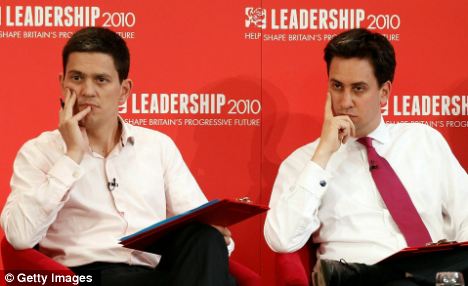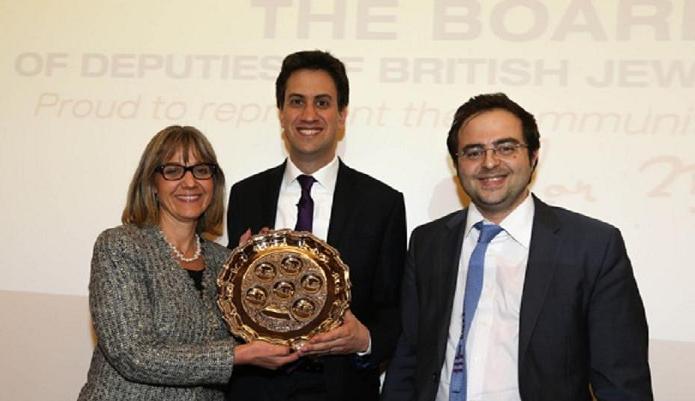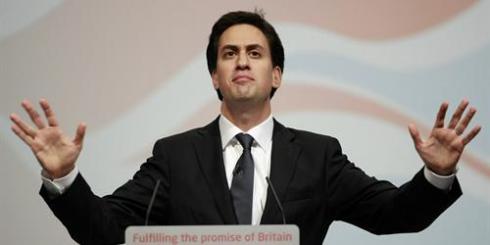Jewish Labour boss Ed Miliband in The Jewish
Chronicle
"Labour leader Ed Miliband used a Labour Friends of Israel lunch this week to
emphasise his family connection to the country..."
"...a speech clearly aimed to allay fears that Mr Miliband did not have the same
commitment to Israel as his predecessors Gordon Brown and Tony Blair..."
"A 'significant and important body of support for Israel' in the
Parliamentary Labour Party was highlighted by Ed Miliband..."
"... winning the support of Jewish voters was important to him"
"Behind the scenes [...] the
big beasts in the Jewish Leadership Council held private discussions with Mr
Miliband..."
"Labour's first Jewish leader has paid tribute to
his religion..."
Note: Underlines in articles below added by Radio Islam for
sake of emphasis

Ed Miliband's links to Israel
By Martin
Bright
The Jewish
Chronicle,
November 17, 2011
Ed Miliband
Labour leader Ed
Miliband used a Labour
Friends of Israel lunch
this week to emphasise
his family connection to
the country that gave
refuge to his
grandmother. In a highly
personal speech to mark
the publication by LFI
of a collection of
essays entitled Making
the Progressive Case for
Israel, he said: "I
wouldn't be here today
if it weren't for the
state of Israel". His
mother's family were
sheltered by Polish
Catholics during the
Holocaust, and
his
grandmother later
settled in Israel.
Mr
Miliband also spoke
about an emotional visit
he had made to Yad
Vashem with his mother
to memorialise the
Polish rescuers on the
"Avenue of the
Righteous".
In a speech clearly
aimed to allay fears
that Mr Miliband did not
have the same commitment
to Israel as his
predecessors Gordon
Brown and Tony Blair,
the Labour leader
emphasised his
admiration for Israeli
democracy.
The audience included
key members of the New
Labour aristocracy,
including Douglas
Alexander, Ed Balls,
Yvette Cooper, Tessa
Jowell and Alan Johnson
as well as rising stars
such as Luciana Berger,
Mary Creagh, Michael
Dugher, Rachel Reeves
and LFI chair John
Woodcock.
Mr Miliband tackled
the issue of his support
for the Palestinian bid
for statehood at the
United Nations, which he
recognised had been
difficult for some in
the room to accept. He
said the task of
leadership was to make
difficult decisions, but
in the context of the
Middle East he always
hoped he would make "the
decision that will
further the cause of
peace". He added that
the decision to back the
change in the law of
universal jurisdiction
had also been a
difficult and had also
been unpopular in some
sections of the party.
He did not mention
Labour's candidate for
London mayor, Ken
Livingstone, who
continues to be a
divisive figure in the
Jewish community.
Israeli ambassador
Daniel Taub revealed
that he had met Mr
Miliband two weeks ago
and welcomed his
"willingness to engage".
The LFI essay
collection, which
includes contributions
from Ms Reeves and Mr
Dugher, was inspired by
the work of former LFI
chair David Cairns, who
tragically died earlier
this year. Mr Cairns's
powerful final speech is
also included.
This ended with a
challenge to opponents
of Israel on the left:
"It is not left-wing or
progressive to ally
oneself with those that
seek Israel's
destruction, or those
who don't value one iota
the type of society we
strive for in this
country. So I am
appealing for all those
who value peace and
justice to support our
values where we see them
lived out, and to assist
- not obstruct - those
people working on the
ground to resolve their
conflict and build their
progressive society."

Miliband backs Israel - and Livingstone
By Marcus Dysch
The Jewish Chronicle, February 16, 2012
A "significant and important body of support for Israel" in the
Parliamentary Labour Party was highlighted by Ed Miliband when he
addressed the Young Norwood current affairs group's annual
reception.
In conversation with the Guardian's Michael White, Mr Miliband
expressed frustration at the impasse in the Middle East peace
process.
He added that winning the support of Jewish voters was important
to him.
He criticised the comments made by Labour MP Paul Flynn
questioning the loyalty of Britain's first Jewish ambassador to
Israel, Matthew Gould, as "totally unacceptable".
Asked by an audience member whether Ken Livingstone's "unsavoury
views" rendered him unfit to stand as Labour's candidate in the
London mayoral election, Mr Miliband alluded to Mr Livingstone's
"inexcusable" clash with Jewish journalist Oliver Finegold in 2005.
Nonetheless, he was "a strong supporter of Ken Livingstone and he
will make an excellent mayor. I know from talking to Ken that
he
would like to rebuild his relationship with the community. He wants
to reach out and build bridges."
The event, which raised £14,000 for Norwood, focused largely on
issues of banking, bonuses and responsible capitalism.
MMr Miliband described the weekly Prime Minister's questions as a
"nightmare. It's a terrible advert for politics and encourages the
view that we are a bunch of schoolkids shouting at each other."

Ed Miliband: 'I'm a Zionist and oppose boycotts of Israel'
By Marcus Dysch
The Jewish Chronicle, March 7, 2013
Ed Miliband told the Board of Deputies of
his opposition to anti-Israel
campaigns
Ed Miliband has pledged to protect
Jewish customs including brit milah and shechita if he
becomes Prime Minister.
Speaking at a Board of Deputies event the Labour leader said
he was opposed to boycotts of Israel and
warned of the need to be “ever-vigilant”against antisemitism.
Asked whether he would work to ensure religious slaughter and
circumcision practices could continue in Britain, Mr Miliband
said: “Yes, these are important traditions. The kosher issue has
recently been brought to my attention. Ways of life must be
preserved.”
He added: “I take antisemitism very
seriously. Any kind of
delegitimisation of Israel is something we should call out for
what it is and not tolerate it.
“I think the boycotts of Israel are
totally wrong. We should have no
tolerance for boycotts. I would say that to any trade
union leaders.”
But Mr Miliband warned the audience that while he was opposed
to anti-Israel activities in this country, people must
“understand the anger and dismay about settlements”.
He said that he considered himself a
Zionist but was critical of some Israeli government
policies. Asked about Labour’s support for the Palestinian bid
for statehood at the United Nations, Mr Miliband said he wanted
to “encourage moderate” Palestinians and work in an
“even-handed” way.
The politician made repeated reference to his support for a
two-state solution to the Middle East conflict and said he hoped
Britain could be an “honest broker” in the peace process.
Mr Miliband said former Labour MP
George Galloway’s refusal to debate with a British-Israeli
student at Oxford University last month was “shameful behaviour”.
“I was shocked by that. It’s one of a long line of things he
has done and that’s the sort of behaviour we should not
tolerate. The idea that he would refuse to
debate him because he was Israeli is totally wrong and
disgraceful.”
The leader of the opposition answered a range of questions on
topics including immigration, education, housing, employment,
the Israeli elections and American baseball.
Around 300 people attended the event in central London on
Thursday evening.

How Ken went from total denial to
unheard-of regret
By Martin Bright
The Jewish Chronicle, March 29, 2012
It was all supposed to be so convivial. On March 1 a peacemaking
dinner was convened at the London Jewish Cultural Centre to bring
Ken Livingstone together with concerned Labour supporters within the
Jewish community.
At the former mayor's side was Simon Fletcher, Mr Livingstone's
longstanding lieutenant, known to have been concerned at the
deterioration of relations with London's Jews.
Because of the sensitivities involved, the meeting was due to be
held under Chatham House rules, although in his opening remarks Mr
Livingstone made it clear he was happy to consider the meeting as
being "on-the-record".
We now know that those present from the Jewish side were a
mixture of high-profile community figures and grassroots activists.
The meeting was chaired by Adrian Cohen, the highly-respected and
long-suffering chair of the London Jewish Forum. Abraham Pinter, the
strictly Orthodox rabbi from Stamford Hill, was there, as was the
chief executive of Liberal Judaism, Rabbi Danny Rich.
Miliband felt the need to hug his
toxic candidate ever closer
Andrew Gilbert, the founding chair of Limmud, attended, as,
crucially, did Guardian and JC columnist, Jonathan Freedland.
This was not the "Jewish leadership" as such, but genuine Labour
supporters who wanted to be reassured about voting for Mr
Livingstone.
The Labour candidate turned out to be characteristically
uncompromising in his approach.
As the JC reported two weeks ago, far from seeking
reconciliation, Mr Livingstone simply outlined his electoral
programme and then proceeded to explain why he had been right to
embrace the radical Islamist cleric, Yusuf al-Qaradawi and take
money from the Iranian state broadcaster Press TV.
Rabbi Pinter told the JC he was disappointed by Mr Livingstone's
response, but worse was to come.
According to those present Mr Livingstone had not only been
unapologetic but had suggested that Jews were too rich to vote for
him. A group of participants, including Rabbi Rich and Mr Gilbert,
decided to write to Labour leader Ed Miliband to express their
concerns.
In the key passage they wrote: "Ken, towards the end of the
meeting, stated that he did not expect the Jewish community to vote
Labour as votes for the left are inversely proportional to wealth
levels, and suggested that as the Jewish community is rich we simply
wouldn't vote for him."
The letter, leaked to the JC, was dynamite.
In the days that followed the Labour high command was left in an
impossible position. Ed Miliband felt obliged to hug his
increasingly toxic candidate even closer, claiming there was not a
prejudiced bone in Mr Livingstone's body and obliging the whole
shadow cabinet to appear on the mayoral campaign trial.
Behind the scenes, the JC understands,
the big beasts in the
Jewish Leadership Council held private discussions with Mr Miliband
at which he gave assurances that something would be done to rectify
the situation.
Meanwhile a new development upped the stakes even further.
Jonathan Freedland, who supported Mr Livingstone in 2008, wrote in
the Guardian that he could no longer do so.
At this point, some within the Labour Party, including Mr
Miliband himself, were still questioning whether Mr Livingstone had
used the words attributed to him.
But the Labour candidate himself clarified matters when he told a
local paper journalist on the Camden New Journal that he stuck by
his view that voting patterns correlated with levels of wealth:
"Every psephological study I've seen in the 40 years I've been
following politics shows the main factor that determines how people
how vote is their income level," he said. "And it's not antisemitic
to say that."
While key Jewish Labour Party supporters continued to press the
leadership for action, Simon Fletcher decided to act. Using contacts
he had developed while Labour was in power in City Hall, Mr
Livingstone's chief aide took advice from senior figures in the
London Jewish Forum about how to take the heat out of the row.
As a result of these discussions, on Monday the decision was made
to approach the JC with a conciliatory piece by Mr Livingstone
paying tribute to London's Jewish community and suggesting a
strategy for a new start.
No one person can take responsibility for making Ken Livingstone
do the right thing and sign off an article that must have been one
of the most painful to which he has ever put his name. Individual
members of the London Jewish Forum and the Jewish Leadership Council
and those who wrote the letter to Ed Miliband must all take some
credit, as must the Labour leader himself.
Rabbi Pinter's words to the JC clearly also had a big impact. And
on the Livingstone side, Simon Fletcher has also been working hard
to mend fences.
But ultimately the decision to eat humble pie lay with Ken
Livingstone himself, and though the Jewish community will never take
him to their heart, some may at least give him credit for admitting
he was wrong.
And as the paper went to press this week,
the Jewish Leadership
Council was meeting Ed Miliband for dinner and the Livingstone issue
was the main item on the menu. With a month to go to election day,
this is a story that will just not go away.

Mazel Tov: Ed Miliband marks wedding by smashing glass
By Jennifer Lipman
The Jewish Chronicle, May 27, 2011
Labour's first Jewish leader has paid tribute to
his religion by smashing a glass at his wedding.
Ed Miliband married his longtime partner Justine
Thornton earlier today at a small civil ceremony outside Nottingham.
The couple tied the knot in the presence of Mr Miliband's brother
David and their two sons.
The Milibands asked the 50 guests to make
charitable donations instead of bringing presents. Mr Miliband wore
a light grey suit from Harold Tillman's Aquascutum label.
Mr Miliband, 41, was elected as the Labour leader
in September in a closely fought contest with his brother.
In his speech at the Labour Party Conferenec
shortly after, he paid tribute to his late father, Marxist
philosopher Ralph Miliband and his mother Marion Kozak, both of whom
came to Britain to escape the Nazis.
He said: "Two young people fled the darkness that
had engulfed the Jews across Europe.
"They arrived with nothing. This country gave
them everything."

David (left) and brother
Ed Miliband

Labour's
Ed
Miliband in 2013 posing with the Board of Deputies of British Jews
and its
Vice President
Laura Marks and
Jewish News editor
Richard Ferrer,
showing off a seder plate he received.

The Different faces of Ed Miliband







































